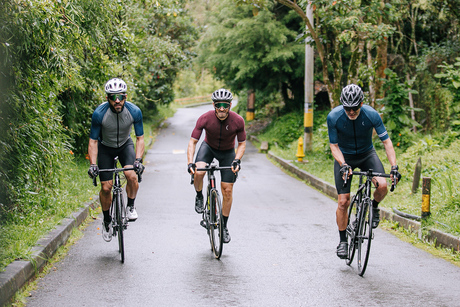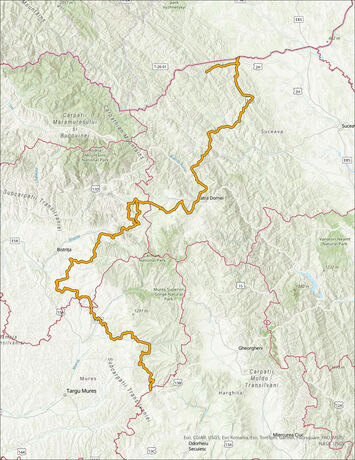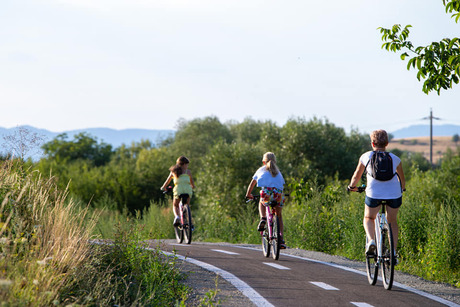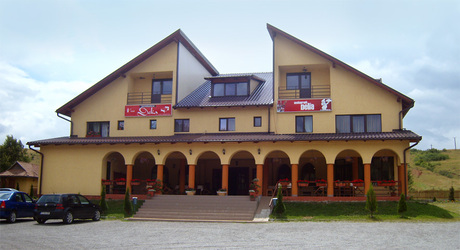
Studies / Analysis / Reports
Travel suggestions
In the following period June 2018 - April 2020, within the project "Development of the partnership between NGOs and the administration for the promotion of sustainable methods of transport within the localities" - code SIPOCA 306/code MySmis 110839, financed within the Operational Program Administrative Capacity 2014-2020 priority axis 1 "Efficient public administration and judicial system", the Alternative Public Policy (PPA) proposal, respectively the National Strategy to encourage the use of bicycles, was developed.
The project was implemented by the Regional Development Agency of the Southeast Development Region in partnership with the Organization for the Promotion of Alternative Transport in Romania (OPATR).
The national strategy to encourage the use of bicycles was developed through a participatory approach, by involving the key actors in the field of mobility, namely representatives of NGOs that promote cycling, social partners, authorities and public institutions at local and central level, the associative structure of local public administration authorities. Thus, the document includes a set of actions aimed at facilitating the frequent use of the bicycle and integrates the consultation process with the relevant actors in the field of mobility, as well as examples of good practice from European states where the implementation of such strategies has had obvious results.
Another initiative in the field of micromobility was the National Velo Plan (NVP), developed within the project "Policies, plans and promotion to increase the number of cycles in the Danube region" (with the acronym "Danube Cycle Plans", approved for funding within the program) transnational Interreg Danube (priority axis 3.1.), which was based on the methodology carried out by the Czech partners within the project, namely "Guideline on how to set up a national cycling plan". The project had the Ministry of Development, Public Works and Administration as its associated strategic partner, with the results to be used in future fundamentals and policies for the development of alternative transport.
The National Velo Plan is a complementary document and an update of the "National Strategy to encourage the use of bicycles", determined by the emergence of new situations and events as:
The project was implemented by the Regional Development Agency of the Southeast Development Region in partnership with the Organization for the Promotion of Alternative Transport in Romania (OPATR).
The national strategy to encourage the use of bicycles was developed through a participatory approach, by involving the key actors in the field of mobility, namely representatives of NGOs that promote cycling, social partners, authorities and public institutions at local and central level, the associative structure of local public administration authorities. Thus, the document includes a set of actions aimed at facilitating the frequent use of the bicycle and integrates the consultation process with the relevant actors in the field of mobility, as well as examples of good practice from European states where the implementation of such strategies has had obvious results.
Another initiative in the field of micromobility was the National Velo Plan (NVP), developed within the project "Policies, plans and promotion to increase the number of cycles in the Danube region" (with the acronym "Danube Cycle Plans", approved for funding within the program) transnational Interreg Danube (priority axis 3.1.), which was based on the methodology carried out by the Czech partners within the project, namely "Guideline on how to set up a national cycling plan". The project had the Ministry of Development, Public Works and Administration as its associated strategic partner, with the results to be used in future fundamentals and policies for the development of alternative transport.
The National Velo Plan is a complementary document and an update of the "National Strategy to encourage the use of bicycles", determined by the emergence of new situations and events as:
- The Covid-19 pandemic and the emergence of the National Recovery and Resilience Plan (NRRP); ∙ A methodology agreed by the nine countries participating in the "Danube Cycle Plans" project; ∙ The result of the first audit of velo policies at national level – Bypad;
- The proposal of a national velo network agreed by all partners of the "Danube Cycle Plans" project and under discussion with local authorities. The future national network is connected with the velo networks of neighboring countries and has the optimal density according to the standards of the "Danube Cycle Plans" project;
- Signing of the Pan-European Master Plan for the promotion of cycling, carried out within the Pan-European Program for Transport, Health and Environment (THE PEP - "The Pan European Master Plan for Cycling Promotion") in 2021 in Vienna;
- Updating the statistical data made within the Danube Cycle Plans project, through the document "Danube Cycle Plans - The Status Quo Questionnaire", developed by the National Institute for Research and Development in Tourism in 2020.
At the same time, in the third quarter of 2022, the National Velo Coordination Center fulfilled Milestone 340 within Component 11 - Tourism and Culture of the National Recovery and Resilience Plan, which aimed to develop the Study on the identification, establishment and territorial distribution of the national cycling routes.
DOCUMENTS:
DOCUMENTS:
- Planul National Velo Final
- DANUBE CYCLE - Oportunități de investiții în rețeaua națională velo
- Romanian National Cycling Plan – English translation
- Studiu privind identificarea, stabilirea și distribuția teritorială a traseelor cicloturistice la nivel național V 01
- ANEXA 1. Hărți privind identificarea și distribuția traseelor cicloturistice la nivel național
- ANEXA 2. Atlasul traseelor cicloturistice la nivel județean

.png?locale=en)


.png?locale=en)



















.png?locale=en)
.png?locale=en)
.png?locale=en)
.png?locale=en)



